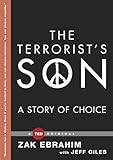The terrorist's son : a story of choice / by Zak Ebrahim ; with Jeff Giles.
Material type: TextPublication details: New York, NY : TED Books, Simon & Schuster, Inc., [2014]Edition: First TED Books hardcover editionDescription: 96 p. : ill. ; 19 cmISBN:
TextPublication details: New York, NY : TED Books, Simon & Schuster, Inc., [2014]Edition: First TED Books hardcover editionDescription: 96 p. : ill. ; 19 cmISBN: - 9781476784809
- 1476784809
- 303.625/019
- HV 6430 E16t 2014
| Item type | Current library | Home library | Collection | Shelving location | Call number | Vol info | Copy number | Status | Barcode | |
|---|---|---|---|---|---|---|---|---|---|---|
 Libro
Libro
|
Biblioteca Juan Bosch | Biblioteca Juan Bosch | Ciencias Sociales | Ciencias Sociales (3er. Piso) | HV 6430 E16t 2014 (Browse shelf(Opens below)) | 1 | 1 | Available | 00000114201 |
"A TED Original"--Jacket.
"Zak Ebrahim, author of The Terrorist's Son," spoke at the TED Conference in 2014. His 9-minute talk, available for free at TED.com, was the inspiration for The Terrorist's Son."--Page [98].
November 5, 1990 : Cliffside Park, New Jersey -- Present day -- 1981 : Pittsburgh, Pennsylvania -- 1986 : Jersey City, New Jersey -- January 1991 : Rikers Island Correctional Facility, New York -- December 21, 1991 : New York Supreme Court, Manhattan -- February 26, 1993 : Jersey City, New Jersey -- April 1996 : Memphis, Tennessee -- December 1998 : Alexandria, Egypt -- July 1999 : Philadelphia, Pennsylvania.
What is it like to grow up with a terrorist in your home? Zak Ebrahim was only seven years old when, on November 5th, 1990, his father El-Sayyid Nosair shot and killed the leader of the Jewish Defense League. While in prison, Nosair helped plan the bombing of the World Trade Center in 1993. In one of his infamous video messages, Osama bin Laden urged the world to "Remember El-Sayyid Nosair." In The Terrorist's Son, Ebrahim dispels the myth that terrorism is a foregone conclusion for people trained to hate. Based on his own journey, he shows that hate is always a choice and so is tolerance. Though Ebrahim was subjected to a violent, intolerant ideology throughout his childhood, he did not become radicalized. Terrorist groups tap into certain vulnerabilities that are usually circumstantial poverty, oppression, disenfranchisement, lack of resources and options. Ebrahim shows how those same vulnerabilities can create great strengths, leading people to form great reserves of empathy and tolerance. He believes that, because we all have a deep capacity for empathy, humans have the choice-and can find the will-to reject negative ideology.
There are no comments on this title.

